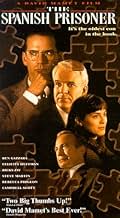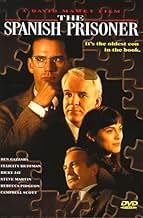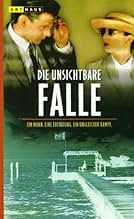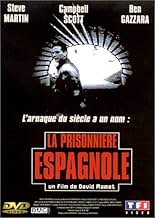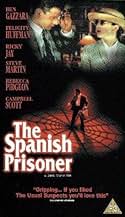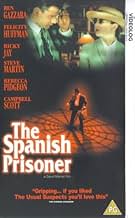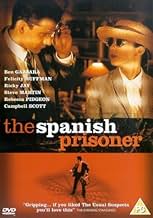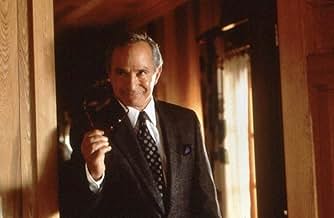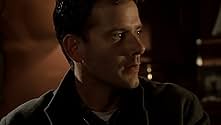ÉVALUATION IMDb
7,1/10
27 k
MA NOTE
Un employé d'une société détenteur d'un processus lucratif secret est tenté de le dévoiler. Mais les choses se compliquent.Un employé d'une société détenteur d'un processus lucratif secret est tenté de le dévoiler. Mais les choses se compliquent.Un employé d'une société détenteur d'un processus lucratif secret est tenté de le dévoiler. Mais les choses se compliquent.
- Prix
- 3 nominations au total
Mike Robinson
- Security Person
- (as Michael Robinson)
Avis en vedette
Basically a story about the theft of a "process", which we may here define as a "MacGuffin", around which an elaborate industrial con game is organized.
In any game (an activity with rules, more than one participant, and a recognizable outcome) there are only three elements: (1) physical skill (you outdrive the cars pursuing you), (2) chance (you jump off the roof and an awning breaks your fall), and/or (3) strategy (you outwit your opponent). Unlike most action movies, Mamet's stories are almost entirely about strategy.
That might make it sound like rather less than it is. Mamet seems to love puzzles -- and puzzles within puzzles -- and the lengths people will go to manipulate one another and, man, is this a prize-winning example of his obsession. As in "House of Game" we have a big con that goes a little astray and winds up not only with the theft of a priceless invention but murder as well.
I realize "Glengarry Glenross" is probably Mamet's most highly esteemed work but I think "House of Games" and "The Spanish Prisoner" are more engrossing because more things HAPPEN. Mamet's dialog always involves a lot of byplay, repetition, non sequiturs, and general ellipsis, but the elegant stylization isn't worth much if it doesn't go anywhere. Here the plot moves from the Caribbean to New York to Boston and with each step the conundrum becomes more difficult to figure out.
Of course the plot is an implausible one because it depends on the heavies being able to predict precisely the moves of the mark, down to small basically unforeseeable details, such as his snooping in a secretary's desk and stealing a souvenir FBI card out of her scrapbook. But it hardly matters because we're swept along so fluidly in the mystery that we don't really question these events. The viewer, by the way, is kept as much in the dark as Scott Campbell, the protagonist.
The performances are all quite apt. Scott Campbell might be a terrific inventor but he's kind of a dim bulb in other respects. He's the kind of highly conventional Schlub that wouldn't DREAM that anyone, let alone an entire organization, would lie with comfort and such powerful effect. You have to wonder what his voting record looks like.
Rebecca Pigeon is, I think, an actress who never got the kind of attention she deserves. She's beautiful in an unconventional, petite, brachycephalic, angular way and her locutions and expressions always seem to suggest she may know more about what's going on inside your head than you do yourself. She delivers Mamet's stylized speeches efficiently but in other films has demonstrated considerable range. "You never know who a person really is," she says. Something else. She may be treacherous, and he may be wary of an office romance, but they seem genuinely attracted to one another. Near the end, when Scott finally kisses her, she draws back and says, "Crikees!", as if amazed and tickled. This is a set up for a final scene when she is hustled into the police van. She's supposed to break away from the cops holding her, run to Scott, throw her arms around him, kiss him fiercely, and confess that her feelings had changed to true love. But no! Thank heaven she has no remorse at all and leaves him with a wisecrack and a sardonic smile. Mamet is nobody's fool.
I ought to mention the score. It's mysterious and melancholic. The main theme is built around a handful of descending notes and the orchestration is simple but a little odd -- bass, piano, quiet woodwinds, and chimes. It is so weird and catchy that it could just about stand on its own.
Repeat viewings don't spoil the polish, even though the viewer knows the solution to the mystery. It's an original commercial product and it's enjoyable.
In any game (an activity with rules, more than one participant, and a recognizable outcome) there are only three elements: (1) physical skill (you outdrive the cars pursuing you), (2) chance (you jump off the roof and an awning breaks your fall), and/or (3) strategy (you outwit your opponent). Unlike most action movies, Mamet's stories are almost entirely about strategy.
That might make it sound like rather less than it is. Mamet seems to love puzzles -- and puzzles within puzzles -- and the lengths people will go to manipulate one another and, man, is this a prize-winning example of his obsession. As in "House of Game" we have a big con that goes a little astray and winds up not only with the theft of a priceless invention but murder as well.
I realize "Glengarry Glenross" is probably Mamet's most highly esteemed work but I think "House of Games" and "The Spanish Prisoner" are more engrossing because more things HAPPEN. Mamet's dialog always involves a lot of byplay, repetition, non sequiturs, and general ellipsis, but the elegant stylization isn't worth much if it doesn't go anywhere. Here the plot moves from the Caribbean to New York to Boston and with each step the conundrum becomes more difficult to figure out.
Of course the plot is an implausible one because it depends on the heavies being able to predict precisely the moves of the mark, down to small basically unforeseeable details, such as his snooping in a secretary's desk and stealing a souvenir FBI card out of her scrapbook. But it hardly matters because we're swept along so fluidly in the mystery that we don't really question these events. The viewer, by the way, is kept as much in the dark as Scott Campbell, the protagonist.
The performances are all quite apt. Scott Campbell might be a terrific inventor but he's kind of a dim bulb in other respects. He's the kind of highly conventional Schlub that wouldn't DREAM that anyone, let alone an entire organization, would lie with comfort and such powerful effect. You have to wonder what his voting record looks like.
Rebecca Pigeon is, I think, an actress who never got the kind of attention she deserves. She's beautiful in an unconventional, petite, brachycephalic, angular way and her locutions and expressions always seem to suggest she may know more about what's going on inside your head than you do yourself. She delivers Mamet's stylized speeches efficiently but in other films has demonstrated considerable range. "You never know who a person really is," she says. Something else. She may be treacherous, and he may be wary of an office romance, but they seem genuinely attracted to one another. Near the end, when Scott finally kisses her, she draws back and says, "Crikees!", as if amazed and tickled. This is a set up for a final scene when she is hustled into the police van. She's supposed to break away from the cops holding her, run to Scott, throw her arms around him, kiss him fiercely, and confess that her feelings had changed to true love. But no! Thank heaven she has no remorse at all and leaves him with a wisecrack and a sardonic smile. Mamet is nobody's fool.
I ought to mention the score. It's mysterious and melancholic. The main theme is built around a handful of descending notes and the orchestration is simple but a little odd -- bass, piano, quiet woodwinds, and chimes. It is so weird and catchy that it could just about stand on its own.
Repeat viewings don't spoil the polish, even though the viewer knows the solution to the mystery. It's an original commercial product and it's enjoyable.
It's hard to say that 'The Spanish Prisoner' is the best film of the year, because it quite obviously isn't. It's more like a filmed play in that many of it's locations, especially those in the Carribean, look positively fake. What can be said, is that the film is the year's most complex and interesting film, and one of the best.
The script by acclaimed playwright David Mamet (Who also wrote 1997's The Edge) is stunning, excellent with a perfect, credible plot. It's a wonder how anyone could even come up with such a great story.
The acting is also very good. Campbell Scott, who we have never and likely never will see much of is well cast and delivers the flick's best performance. A-List star Steve Martin skips the big bucks for a good script, and it's a wonder he ended up with this project in the first place, an unlikely but excellent career move. The rest of the cast is unremarkable when put up against Scott and Martin, but still good on their own right.
If you have a liking for complicated, though-provoking puzzle-like films 'The Spanish Prisoner' is highly, highly recommended, as is the similar, more accessible 'The Game'. Very intriguing and absorbing 'The Spanish Prisoner' is a must see.
The script by acclaimed playwright David Mamet (Who also wrote 1997's The Edge) is stunning, excellent with a perfect, credible plot. It's a wonder how anyone could even come up with such a great story.
The acting is also very good. Campbell Scott, who we have never and likely never will see much of is well cast and delivers the flick's best performance. A-List star Steve Martin skips the big bucks for a good script, and it's a wonder he ended up with this project in the first place, an unlikely but excellent career move. The rest of the cast is unremarkable when put up against Scott and Martin, but still good on their own right.
If you have a liking for complicated, though-provoking puzzle-like films 'The Spanish Prisoner' is highly, highly recommended, as is the similar, more accessible 'The Game'. Very intriguing and absorbing 'The Spanish Prisoner' is a must see.
What is so clever about this movie?
First: The dialogue is so wonderfully quirky and packed full of nuances. It was a delight to wait for the next round of words in each scene. The character played by Rebecca Pidgeon offered the best delivery of all the actors. Her vocal cadences were sheer fun to experience.
Second: It perfectly paced right down to the wonderfully offbeat and unexpected ending. It is NOT a slow moving film. Even if the drama unfolds methodically:
**WHAT is wrong with audiences today? WHY must every movie go faster than the Can-Can scene in "Moulin Rouge"? I get ill when I read yet another review which reveals the impatience and lack of concentration skills of the viewer. You want slow pace? Try Theo Angelopoulos!
Third: The cast is perfect for every role. Campbell Scott, Steve Martin, Rebecca Pidgeon, Felicity Huffman, Ben Gazzara and Ricky Jay. Each of them bring a special character to each performance.
Fourth: Movies like this, that don't feed you every morsel of the plot expectation in the first 15 minutes are a welcome breath of fresh air every time they are released.
Congratulations on a most memorable movie to Mamet and company.
First: The dialogue is so wonderfully quirky and packed full of nuances. It was a delight to wait for the next round of words in each scene. The character played by Rebecca Pidgeon offered the best delivery of all the actors. Her vocal cadences were sheer fun to experience.
Second: It perfectly paced right down to the wonderfully offbeat and unexpected ending. It is NOT a slow moving film. Even if the drama unfolds methodically:
**WHAT is wrong with audiences today? WHY must every movie go faster than the Can-Can scene in "Moulin Rouge"? I get ill when I read yet another review which reveals the impatience and lack of concentration skills of the viewer. You want slow pace? Try Theo Angelopoulos!
Third: The cast is perfect for every role. Campbell Scott, Steve Martin, Rebecca Pidgeon, Felicity Huffman, Ben Gazzara and Ricky Jay. Each of them bring a special character to each performance.
Fourth: Movies like this, that don't feed you every morsel of the plot expectation in the first 15 minutes are a welcome breath of fresh air every time they are released.
Congratulations on a most memorable movie to Mamet and company.
Well, if they learned one thing from making this film, I hope it's that Mamet should never sit in a director's chair again. I'm not prejudiced against Mamet. I like some of his films, particularly Glengarry Glen Ross, which is actually one of my favorites. But The Spanish Prisoner plays and sounds like a high school production. Literally.
I cannot for the life of me understand how this film can be called intelligent. Yes, it does not rely on violence, sex, swearing, drugs, alcohol, traffic violations, or even jaywalking to at least make it interesting. So call it a moral film, whatever that means. Oh, yes, it has a "plot." I assume that is why it's called intelligent.
I sat through this "plot" not knowing a thing about the film and I could see and hear the twists coming like I was tied to a post watching a host of bison pounding impending death into my ears. Plus it had more holes in it than a room full of acupuncture patients.
To begin, the editing was AWFUL, particularly the initial 30 minutes. Typically, when two characters walk into a room, it really does look like they were engrossed in conversation before walking in front of the camera. But in TSP, it looks like Mamet had just given the go ahead to roll tape. It played like it was made up of strips of paper cut up with scissors and then glued together. There might as well have been a speedbump noise every time there was a scene change.
And the dialogue?! What is even more discouraging than the abysmal quality of most films coming out now is when we're sold a piece of goods and people are convinced that it's intelligent. At least with the first problem, we're merely disgruntled. With the second, we're delusional. I find that depressing. So this film depressed me for that reason.
How contrived TSP is is metaphorically represented by the prime element of its plot structure: "The System." OK? I don't mind vague points. But this is just lazy. Why couldn't he just have made it top-secret information which could be used for insider trading? Or information about a revolutionary new product? The plot of Episode I: The Phantom Menace? Mamet may be acclaimed as a "genius," but he has to do more than throw out a script with a twist to have me sacrificing my first-born to his word processor.
I will grant you that art is not life. That said, it should not be more artificial than artifice requires. If Mamet hopes to continue holding an audience made up of more than sophomoric dilettantes, he should take some advice from another author. The "overdone or come tardy off," though it might impress some, "cannot but make the judicious grieve." Reform it altogether, David.
I cannot for the life of me understand how this film can be called intelligent. Yes, it does not rely on violence, sex, swearing, drugs, alcohol, traffic violations, or even jaywalking to at least make it interesting. So call it a moral film, whatever that means. Oh, yes, it has a "plot." I assume that is why it's called intelligent.
I sat through this "plot" not knowing a thing about the film and I could see and hear the twists coming like I was tied to a post watching a host of bison pounding impending death into my ears. Plus it had more holes in it than a room full of acupuncture patients.
To begin, the editing was AWFUL, particularly the initial 30 minutes. Typically, when two characters walk into a room, it really does look like they were engrossed in conversation before walking in front of the camera. But in TSP, it looks like Mamet had just given the go ahead to roll tape. It played like it was made up of strips of paper cut up with scissors and then glued together. There might as well have been a speedbump noise every time there was a scene change.
And the dialogue?! What is even more discouraging than the abysmal quality of most films coming out now is when we're sold a piece of goods and people are convinced that it's intelligent. At least with the first problem, we're merely disgruntled. With the second, we're delusional. I find that depressing. So this film depressed me for that reason.
How contrived TSP is is metaphorically represented by the prime element of its plot structure: "The System." OK? I don't mind vague points. But this is just lazy. Why couldn't he just have made it top-secret information which could be used for insider trading? Or information about a revolutionary new product? The plot of Episode I: The Phantom Menace? Mamet may be acclaimed as a "genius," but he has to do more than throw out a script with a twist to have me sacrificing my first-born to his word processor.
I will grant you that art is not life. That said, it should not be more artificial than artifice requires. If Mamet hopes to continue holding an audience made up of more than sophomoric dilettantes, he should take some advice from another author. The "overdone or come tardy off," though it might impress some, "cannot but make the judicious grieve." Reform it altogether, David.
I finally got to see this film again. I love this film. But I realized after another viewing with a savvy partner that there are just too many holes in the plot and Mamet isn't quite as clever as we first think or would like to believe. Too many plot twists just don't make sense on second viewing. I'd always recommend this movie.. it's fascinating and has great performances but I think the audience is easily tricked into finding it brilliant. Maybe someone can explain why Martin's character is so easily found in the car showroom. Did I miss something there? And what if Campbell Scott's person had actually tried to deliver the tennis book directly to Martin's sister. That would have been the end of the story, period.
Le saviez-vous
- AnecdotesDavid Mamet cast Steve Martin in an atypically villainous role after seeing him perform in Waiting for Godot on stage. He felt instinctively that comedians can make very strong dramatic actors as Jackie Gleason proved in L'arnaqueur (1961) and Jerry Lewis did in La valse des pantins (1982).
- GaffesWhen the rendezvous in Central Park is set up, Scott is told to go to the Navy Fountain. The fountain that he goes to is actually the Bethesda Fountain.
- Citations
George Lang: Worry is like interest paid in advance on a debt that never comes due.
- Bandes originalesI Wonder Who's Kissing Her Now
Written by Frank R. Adams (as Frank Adams), William M. Hough (as Will Hough),
Joseph E. Howard (as Joseph Howard) and Harold Orlob
Arranged by Play-Rite Music Rolls, Inc.
Played at the carousel
Meilleurs choix
Connectez-vous pour évaluer et surveiller les recommandations personnalisées
- How long is The Spanish Prisoner?Propulsé par Alexa
Détails
- Date de sortie
- Pays d’origine
- Langue
- Aussi connu sous le nom de
- The Spanish Prisoner
- Lieux de tournage
- sociétés de production
- Consultez plus de crédits d'entreprise sur IMDbPro
Box-office
- Budget
- 10 000 000 $ US (estimation)
- Brut – États-Unis et Canada
- 9 593 903 $ US
- Fin de semaine d'ouverture – États-Unis et Canada
- 124 011 $ US
- 5 avr. 1998
- Brut – à l'échelle mondiale
- 9 593 903 $ US
Contribuer à cette page
Suggérer une modification ou ajouter du contenu manquant

Lacune principale
By what name was La prisonnière espagnole (1997) officially released in India in English?
Répondre

